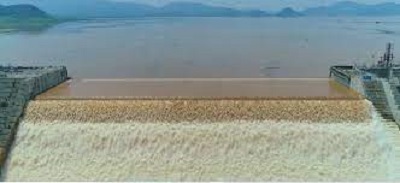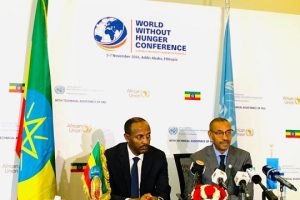
BY FITSUM GETACHEW
The political dynamics in Ethiopia is now in fervent mood because there are new and many times unexpected events taking place in the country. In a way the country is also undergoing various changes trying to come to terms with what has been going wrong for decades. The narratives that have been peddled along the decades have produced several undesirable but intentionally prospected consequences such as creating suspicion between communities and triggering animosities. This has occupied the minds of citizens and their aspirations for democracy and justice have been stifled.
Ethiopia has also been highly exposed to developments outside its borders. Being one of the key countries in the attempts to integrate in regional groups such as IGAD (the Intergovernmental Authority for Development) and, COMESA (the Common Market for East and South Africa), it occupies a pivotal space.
Being the source of much of the Nile waters which baths more than ten African countries, but above all, having a huge role in the politics and economics of the three major riparian countries of the Blue Nile or, Abay as it is called in Ethiopia, the importance of Ethiopia becomes even more marked. Ethiopia’s position in the Horn of Africa including Sudan, Eritrea, Djibouti, and Somalia becomes even more pivotal. The route along the Red Sea, the Persian Gulf, the Babel el mendeb Straits and the entire Middle East occupies vital importance as a trade route between Europe and Asia and the rest of the world, as well as its geo-political and strategic significance cannot be overstated. Many say peace in this part of the world is a key to peace in the entire world. It may sound a bit exaggerated but it is difficult not to find some truth in this assertion.
The Ethiopian government has long declared its intentions on harnessing the potential of the Nile River for its development prospects. It has been its dream for decades but these were frustrated by various factors.
At the same time Egypt has been peddling the narrative that the Nile is its exclusive property handed to it by nature and history denying the crude evidence that the Nile has its source in Ethiopia! Egyptian politicians have gone to a great extent convincing their nationals that the Nile originates from the Aswan Dam!
In the meantime the government of Ethiopia has repeatedly cleared its intention of not harming the interests of Egypt. It has sent successive prime ministers repeatedly to Cairo to clear its intentions, dismissing the complaints and accusations of certain extremist Egyptian politicians. No wonder the Nile is viewed ‘a political issue’ in Egypt.
Ethiopia understands whatever anxiety Egyptians may feel. Ethiopia is a law abiding country. What rests behind the intention of building the Grand Ethiopian Renaissance Dam, GERD, is only the need to free millions of its citizens from darkness.
What is more, Ethiopia wants to benefit from the export cheap hydropower to neighbors. This would also advance regional integration. Ethiopia has repeatedly pledged not to hurt downstream countries through this flag project and has presented its plans with all the experts’ analysis and findings on the project.
Ethiopia of course understands that the life of millions in Sudan and Egypt rely on the Nile waters, and it would be unthinkable that Ethiopia would block the flow of the water. Ethiopia believes the GERD should not be a point of contention but rather one of regional cooperation and integration. One hundred twenty million people expect their government to do its job properly, and exploit resources to their benefit.
For decades Ethiopia’s intention of developing the waters of the Nile was frustrated by lack of resources. Today such resource has been harnessed because practically every national has put its backing behind this project and we see that the dam has seen the light of day.
Furthermore, the GERD cannot be seen as an obstacle for peace in the sub region. Rather it must be welcome, and neighbors should have cooperated even in availing the capital that it needs to complete thereby receiving the benefits in shorter times. The project would end earlier.
Nevertheless, it appears that Egypt and, to a certain extent Sudan, seems to worry too much about this project. However, for Ethiopians GERD is a matter of sovereignty even more than its economic significance.
No one can deny the right of a sovereign country from developing its natural resources. If we all agree that the Nile is an Ethiopian river, independently of the fact that it never developed it due to various historical and economic reasons, nevertheless, this fact cannot authorize both Egypt and Sudan to block its usage by Ethiopia.
Throughout the past decades Ethiopia was too weak economically to exploit the potential of the Abay River. Contrarily, Egypt and Sudan enjoyed exclusive rights on it. However, Ethiopians have now come together to terminate this sad story! The necessary funds have been raised to be able to build the GERD. Despite the good intentions and the guarantees Ethiopia has made to downstream countries, Egypt and Sudan have been expressing their reservations on the usage Ethiopia intends to make on the Nile while Ethiopia has repeatedly dismissed the allegations underlining its true intentions.
Ethiopia has promised to abide by all relevant international trans-boundary rivers laws. It has pledged that it does not have any intention of harming down-stream countries. But Egypt has been maintaining that its rights on the Nile are ‘natural and historical’ and refers frequently to the outmoded colonial era pacts with no validity to Ethiopia (which was not even consulted when England, Egypt and Sudan sealed their pact).
There have been a series of talks regarding the GERD, and Ethiopia’s position. A number of expert analyses were made and presented, and scholars have debated at length on what implications the dam may bring to riparian. The findings have been in favor of Ethiopia’s stance. Ethiopia has explained that the government has not only the right but also the duty to develop all the resources nature has provided it for the benefit of its citizens.
It should not be forgotten that for thousands of years Egypt and Sudan have made undisturbed and unrestricted use of the water. But not only that, they also benefited from the fertile soil the water carried away from the highlands of Ethiopia!
Egypt and Sudan have been extremely lucky in this respect. Ethiopians did not have the necessary means to develop the Nile waters but this must not be intended to forfeiting its rights on the river. Today Ethiopia is at such a point that it is capable of gathering all the financial means to build a dam and use it to generate power. Today Ethiopia is also country of 120 million of whom more than half is in darkness due to lack of power. The Nile water in this regard becomes a key as Ethiopia embarks on this project. That is why Ethiopia maintains that the Nile is a matter of survival for it as it is for Egypt or Sudan!
It might take years to complete this huge project but going on with the current pace the completion of the project seems in sight. The dam has already slowly begun to produce fruits, and with time and gradually it would have more water in the reservoir and more turbines will be made to turn and produce more power. It is a slow process also because it takes time to fill the dam without harming the downstream countries. Ethiopia has shown exception caution on this point.
During the past two rainy season fillings, the flow of the Nile has not been affected as there was surplus water. The ‘third filling of the dam’ will take place shortly and Ethiopia needs to maintain the momentum with the completion of the dam’s construction so that more water is harnessed in the reservoir. Once the project is complete there will be no water to catch but let it go by serving to turn the turbines.
GERD is hence a huge project with vital importance not only to Ethiopians but also to neighbors. The government of Ethiopia hopes that Egypt and Sudan will cooperate with Ethiopia instead of trying to obstruct the path towards a speedy completion of the project. It is high time that confrontation on the Nile be replaced by a spirit of cooperation. A new era of integration and common growth must replace confrontations.
The Ethiopian Herald June 7/2022




